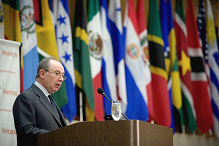
Typical street scene in Santa Ana, El Salvador. (Photo: iStock)
IMF Survey: De Rato Voices Hedge Fund Concerns
May 16, 2007
- Globalization poses both financial and trade risks
- Hedge funds attract large sums from usually cautious pension funds
- Doha Round needs successful conclusion to forestall protectionism
IMF Managing Director Rodrigo de Rato said on May 2 that in an increasingly interdependent world, two of the greatest areas of opportunity and risk lie in financial globalization and trade.

De Rato speaks at Council of the Americas in Washington, D.C. (photo: Eugene Salazar/IMF)
FINANCIAL GLOBALIZATION
He cited concerns about hedge funds, which are now attracting large sums of money from usually cautious pension funds. He also called for a successful conclusion to the Doha trade round to forestall rising protectionist sentiment.
In an address to the Washington Conference of the Council of the Americas, de Rato said that pension funds provide about 30 percent of the investment in hedge funds, pools of well-heeled investors that often make higher-risk investments in search of larger than normal returns. "
It may be that pension funds are using hedge fund investment to diversify their own risks, but a situation where almost one-third of the capital for institutions on the cutting edge of financial risk comes from institutions whose first priority is safe investments certainly bears watching," he said.
Financial market efficiency
In general, de Rato said, recent developments call into question whether hedge funds are delivering on the benefits they can bring to financial market efficiency: improving market liquidity and spreading risks to those investors "most prepared to take them." Not only are hedge funds—which he estimated number 9,500 worldwide—raising money from sources such as pension funds that historically are cautious risk takers, returns for some hedge funds are close to average market returns, "casting doubt on their contribution to risk diversification," he said.
De Rato said that he broadly agrees with the approach to hedge funds being taken by the Bush administration's Presidential Working Group on Financial Markets—that hedge fund risks should be controlled "mainly through investor due diligence, counterparty risk management, and the exclusion of unsophisticated investors." But he said that as the structure of markets changes, regulators may need to adapt the framework of supervision "to improve investor protection and reduce systemic risks and vulnerabilities."
Spillover effects
De Rato said there are several other developments in U.S. financial markets that "bear watching" by policymakers in the United States and Latin America, a region that could suffer from spillover effects of a tightening of financial market conditions in the United States. Problems in the subprime mortgage lending market "may not yet have played out fully in terms of financial distress and foreclosures and may well extend the downturn in the housing market," he said.
There are also "significant risks in the recent increase in large private equity buyouts financed by a rising proportion of debt" because if some of the deals turned sour investors might become more risk averse, which would curtail market access for lower-rated corporate borrowers and hurt investment and growth prospects.
It is important to bring the Doha round of trade negotiations, which began in late 2001, to "a conclusion that delivers ambitious reforms," de Rato said. Although it will take "many hands" to complete the talks successfully, the United States is crucial to a good outcome, he said.
"An extension of the U.S. administration's fast-track negotiating authority," which expires June 30, will almost certainly be necessary, De Rato stated. "The terms of such an extension are a matter for the U.S. Congress, but the results of their decision are important not only for the United States but also for the rest of the world," he added.


